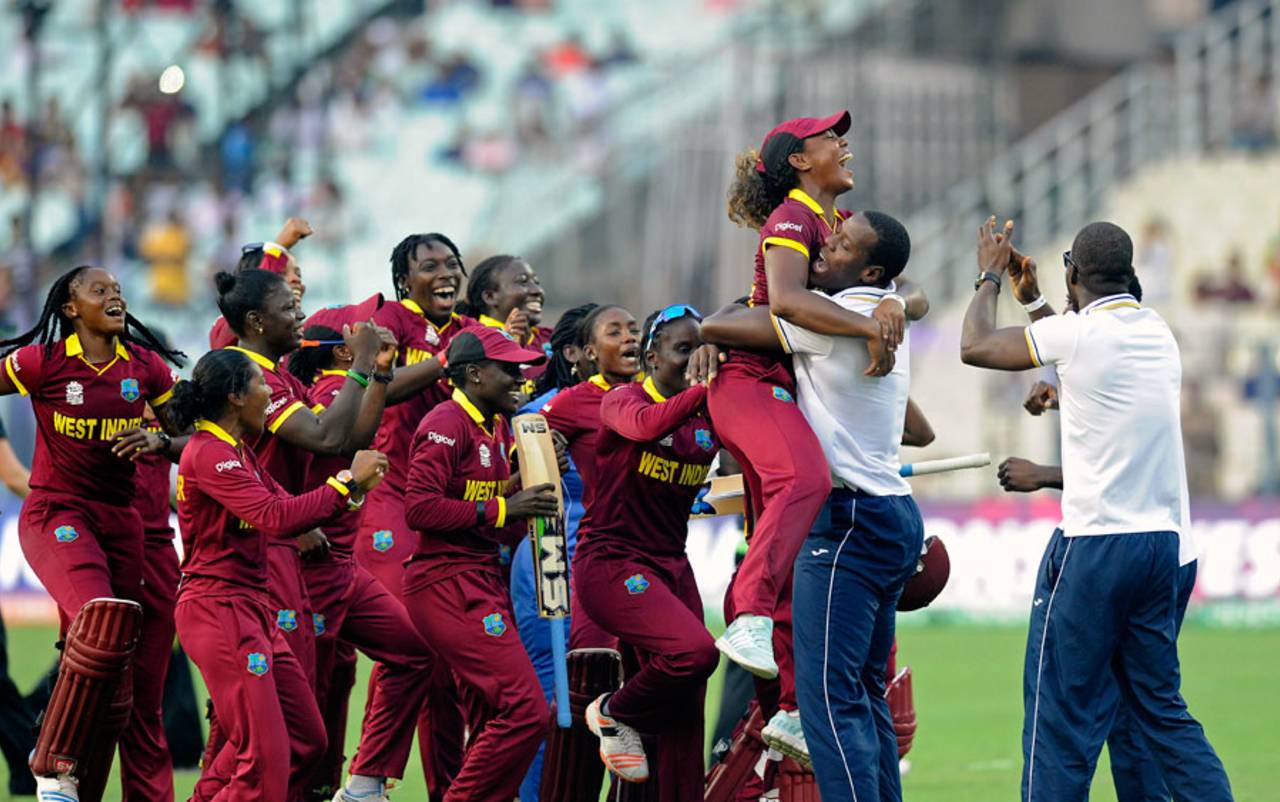Does West Indies' World T20 win signal the death of their Test cricket?
The victory may boost grass-roots cricket in the Caribbean but not in the longer format
Michael Jeh
05-Apr-2016

West Indies now hold the world Under-19 and the men's and women's T20 titles, but will the next generation of players gravitate towards Test cricket at all? • IDI/Getty Images
At a time of rebirth, it seems incongruous to say the West Indies' triumph rings the death knell for their long-form cricket aspirations. Yet one cannot but wonder if that magnificent finale by Carlos Brathwaite spells the end of Test cricket, maybe even ODI success, for this mighty cricketing nation.
Inasmuch as West Indies played some of their most abject cricket towards the end of 2015 in Australia, in three short months, there has been the most remarkable turnaround imaginable. An Under-19 championship, and now the men's and women's T20 crowns.
Of course, the Test team and the T20 team share very little except the logo on the shirts. And yet, in a delicious irony, two of three Test players in the starting XI for the World T20 final, Marlon Samuels and Brathwaite himself, were the unlikely heroes at the death. There were times in the summer when the chances of Samuels ever playing any form of cricket for West Indies were possibly questionable. Eighty-five not out in a winning team? Never!
There can be no glossing over the fact that the West Indies Test team is as poor as it gets in world cricket, almost as poor as any Test team has ever been, except for when new countries began playing the format perhaps. The team that competed (did they really compete?) for the Sir Frank Worrell Trophy was possibly the weakest team ever to tour Australia since World War II. Certainly, in terms of a fall from grace from the halcyon days of Clive Lloyd and Viv Richards, it was the most acute deviation. During the post-mortems, there was doom and gloom about the future of cricket, any cricket, in the islands. Was anyone crazy enough to venture that in barely three months they would be crowned champions at the U-19 level and then go on to win both men and women's World T20s?
As much as I rejoiced at their twin triumphs on Sunday, it is with some fear that I now realise what this might mean for their long-form cricket. This success may breathe new life into grass-roots cricket (I sincerely hope so), but it is more probable that it will further widen the chasm that separates the T20 glamour set from the Test whipping boys. Why would the next generation of power hitters bother with a poorly paid, arduous format with humiliation at every turn (on and off the field) when they can sell their wares at the franchise expo and still suit up in West Indies colours every few years and steal the glory?
The writing was on the wall last summer. Australia may well have cannibalised their own Test summer by creating a Frankenstein's monster in the form of the Big Bash. While poorly equipped Test players were being knocked over inside three days, switch channels on TV and you could have wtached Chris Gayle, Dwayne Bravo, Andre Russell, Samuel Badree, Lendl Simmons and Darren Sammy strutting their wares. Sunil Narine and Kieron Pollard were not even in the picture and are unlikely to ever wear whites again. Add a decent fast bowler or two (are there any?) and you've got an infinitely more attractive prospect than the current Test squad.

The West Indian Test side that toured Australia in December-January was one of the poorest to ever visit the country•Cricket Australia/Getty Images
Is there depth to sustain optimism? On one hand, a winning U-19 team suggests there is plenty of talent coming through. The women's team might be the catalyst for more young girls to chase the cricket dream instead of putting their athletic limbs on the basketball or track-and-field markets. Yet if you look at the age of the men's T20 team and look in the rear-view mirror, are there players coming up behind them to suggest continued success in any format?
If Denesh Ramdin is the best wicketkeeper-batsman in all three formats, what does that tell you about depth in a key position?
Dance they might well have done as night gave way to dawn in Kolkata, but will this be the day when the sun finally sets on Test cricket in the West Indies?
What is there now to suggest that the embattled WICB can use this moment as a catalyst to breathing new life into all forms of the game? What is there now to motivate the young West Indians, male or female, to reclaim their heritage as the calypso kings in white?
For the sake of neutrals like me who grew up loving the West Indian legacy, we can only hope that the custodians of the game will not see this moment of glory as the excuse to walk away from the slow dance that still defines the ultimate test of cricketing skill.
That T20 cricket sparked so much bad blood before, during and after the final speaks of the passion that the players have for this format, a passion absent for long in every other aspect of West Indies cricket. Like the game itself, the brilliance illuminated the night briefly, but as the reality of boardroom politics sinks in, one fears that in winning the battle, they might just surrender the war.
Michael Jeh is an Oxford Blue who played first-class cricket, and a Playing Member of the MCC. He lives in Brisbane